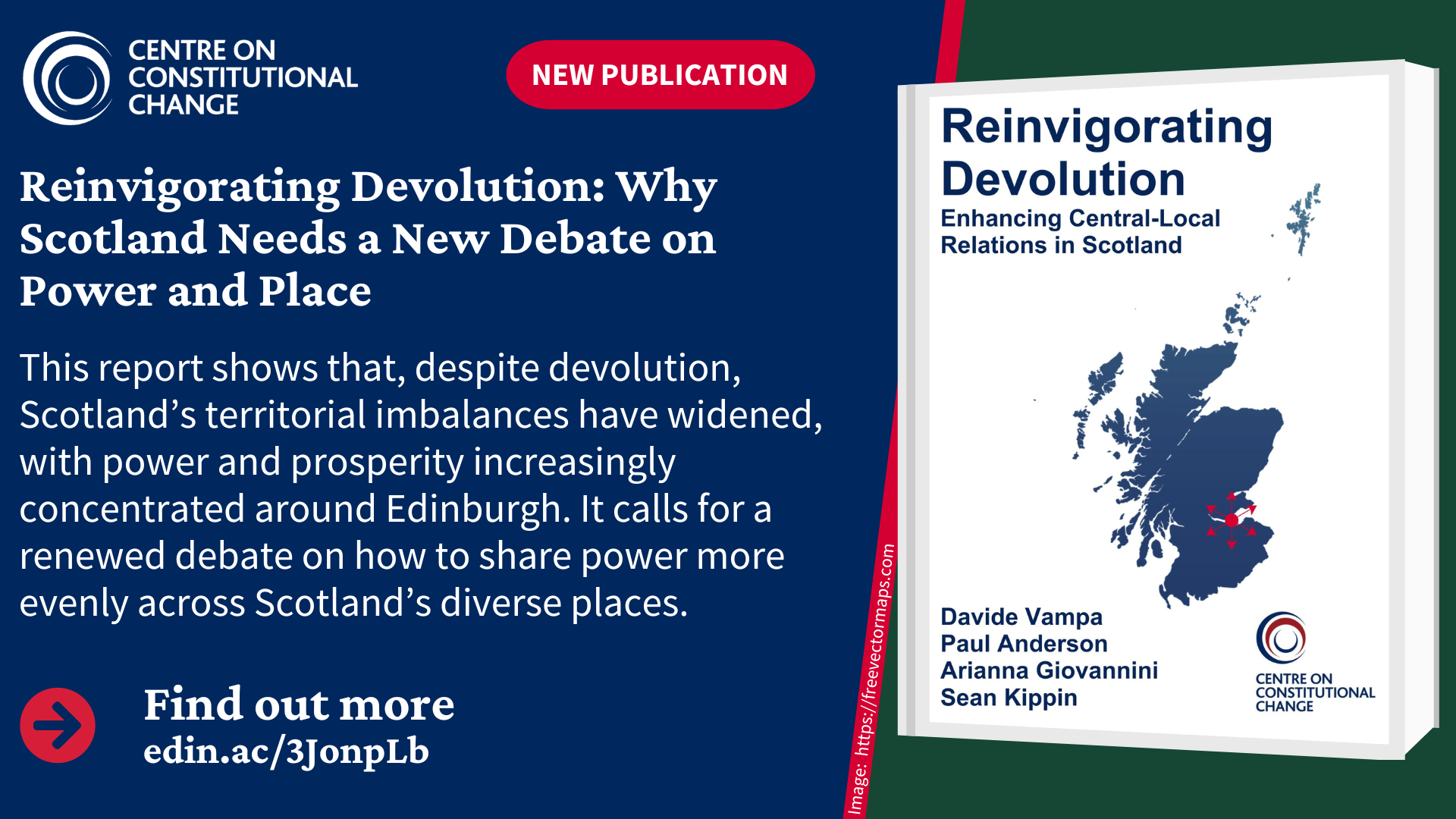Reinvigorating Devolution: Why Scotland Needs a New Debate on Power and Place

By Davide Vampa (University of Edinburgh), Paul Anderson (Liverpool John Moores University), Arianna Giovannini (University of Urbino), and Sean Kippin (University of Stirling)
Over 25 years since the (re)establishment of the Scottish Parliament, devolution has reshaped how Scotland is governed. Yet a striking imbalance remains at the heart of the system: power and prosperity have become ever more concentrated in and around Edinburgh.
In our new report, Reinvigorating Devolution: Enhancing Central-Local Relations in Scotland, we show that Scotland’s territorial inequalities have deepened in three interconnected ways – economic, institutional, and perceptual. Economic activity and population growth have become increasingly concentrated in the East-Central Belt; political decision-making has centralised at Holyrood, limiting the role of local government; and many Scots, particularly in rural and peripheral areas, perceive devolution as having disproportionately benefited wealthier regions.
Beyond diagnosing these trends, the report also asks how Scotland might address them. In light of increasing interest in empowering local communities and enhancing the status of Scottish cities, notably in Scottish Labour, we examine lessons from England’s experience with combined authorities and directly elected mayors, assessing what elements of that model might – and might not – be relevant north of the border. We then make the case for a distinctive Scottish approach, one that recognises Scotland’s own territorial diversity and democratic traditions rather than importing institutional templates wholesale. Finally, we outline eight guiding principles for reform to rebalance central–local relations – from enhancing territorial equity and local capacity to embedding subsidiarity and public engagement at the heart of devolved governance.
Scotland’s economic centre of gravity has shifted east
Since 1999, Edinburgh and the East-Central Belt have consolidated their position as Scotland’s dominant hubs of productivity and population growth. Edinburgh’s economic output per head is now nearly double the national average – a gap that has grown faster than London’s advantage over the rest of England. Meanwhile, much of rural and western Scotland has lagged behind.
This eastward shift is not just about the economy. It reflects wider social and demographic patterns – including migration towards areas offering more jobs and opportunities – that risk leaving peripheral parts of the country further behind.
Power has centralised in Holyrood
When devolution was introduced, many expected decisions to be brought closer to communities. Instead, the system has replicated some of the centralising tendencies long associated with Westminster. Local government remains fiscally constrained and politically dependent on Holyrood. Councils lack the powers and resources to act as meaningful counterweights or to respond flexibly to local needs.
In effect, Scotland has become a “decentralisation of centralism”: powers have moved from London to Edinburgh, but not much further.
Public opinion reflects these imbalances
Survey data from our research show that many Scots – especially those in rural or peripheral areas – believe that devolution has benefited central and affluent regions more than their own. Over half of respondents think the Scottish Government favours urban and core areas such as Edinburgh over rural and peripheral ones.
This perception of “territorial bias” poses a democratic challenge. If people outside the central belt (and outside Edinburgh) feel that devolution has passed them by, trust in Scotland’s institutions could erode.
Learning from England – but not copying it
The growing debate over power and territorial inequalities in Scotland has prompted comparisons with England’s recent experiments with combined authorities and directly elected mayors. These reforms were designed to address over-centralisation in England – and while they have increased local visibility and coordination in places like Greater Manchester, they have also produced uneven results and limited fiscal autonomy.
For Scotland, the lesson is not to copy English models wholesale but to learn from their strengths and shortcomings. Directly elected mayors might work for cities like Glasgow, but they are ill-suited to the country’s rural and island areas. Scotland needs a bespoke approach that recognises its territorial diversity.
Towards a more balanced devolution
Our report proposes eight guiding principles for reform. At their core is a simple idea: power in Scotland should be shared more evenly – not only between Edinburgh and London, but also between Holyrood and local communities.
Such change should promote territorial equity, democratic subsidiarity, and local legitimacy, while recognising Scotland’s institutional distinctiveness and diverse geography. It must also invest in local capacity and public engagement, ensuring that citizens themselves shape the future of their local democracy.
Scotland now faces a critical moment. As the constitutional debate evolves, there is a growing opportunity to reimagine devolution from the ground up – making it not just about where Scotland sits within the UK, but about how power, opportunity, and voice are distributed within Scotland itself.
The report and related research
The full report can be found here.
It forms part of a wider research agenda on territorial governance, central–local relations, and devolution across the UK. Readers interested in exploring these themes further can consult the following recent publications by the authors:
- Davide Vampa, “Uneven benefits? Territorial divides in perceptions of devolution in Scotland and Wales,” Territory, Politics, Governance (2025). Read here
- Paul Anderson and Tom Arnold, The State of Intergovernmental Relations in England: Towards a New Era of Partnership? (Liverpool: Heseltine Institute, 2025). Read here
- Arianna Giovannini, “The 2021 Metro Mayors Elections: Localism Rebooted?” The Political Quarterly (2021). Read here and “Rethinking Levelling Up: Caring for Place, Empowering Connectors, and Redesigning our Culture of Governance,” IPPR North (2022). Read here
- Janice Morphet and Sean Kippin, “Devolution within devolution? A SWOT analysis of introducing combined authorities to Scotland,” Public Money & Management (2025). Read here